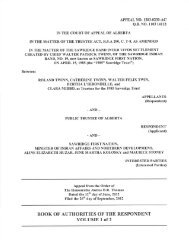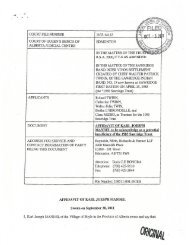31420-12-1 SAWRIDGE, Indian vs. ROLAND, Twinn et al
31420-12-1 SAWRIDGE, Indian vs. ROLAND, Twinn et al
31420-12-1 SAWRIDGE, Indian vs. ROLAND, Twinn et al
You also want an ePaper? Increase the reach of your titles
YUMPU automatically turns print PDFs into web optimized ePapers that Google loves.
F56<br />
1 the minors while they have the du<strong>al</strong> roles we’ve described in some of our materi<strong>al</strong>s. So<br />
2<br />
3<br />
just a --<br />
4THE COURT: So you are saying a sort of still future<br />
5<br />
6<br />
litigation --<br />
7MS. HUTCHISON:<br />
8<br />
Well --<br />
9THE COURT:<br />
10<br />
-- now?<br />
11 MS. HUTCHISON: -- I’m saying re<strong>al</strong>ly is a lack of comfort with<br />
<strong>12</strong> paying agovernment entity a reason not to provide the minors with independent objective<br />
13 representation? There’s been a long lead-up to this application; and if that were the only<br />
14 concern, if that was the only barrier to providing the minors with independent and<br />
15 objective representation, I’m simply submitting that the Sawridge trustees had some very<br />
16 clear options to access that independent objective representation and pay another entity or<br />
17 another individu<strong>al</strong> or a lawyer that could be appointed as next friend of their choice, quite<br />
18 frankly. Imean, the Court would have had to be -- had to have been satisfied that the<br />
19<br />
20<br />
individu<strong>al</strong> was appropriate.<br />
21 For whatever reason, they’ve chosen not to do that; and that’s part of why the Court is<br />
22 left, at this point in time anyway, with effectively one entity before you that could<br />
23<br />
24<br />
potenti<strong>al</strong>ly be objective and independent in representing the minors.<br />
25 My friends made the -- I’m sorry, my friend Ms. Bonora made a few submissions about<br />
26 the Public Trustee’s mandate being to represent minors, and it was presented essenti<strong>al</strong>ly as<br />
27 a gener<strong>al</strong> duty; and again -- and a comment was sort of made about if we’ve identified<br />
28 issues, how can we abandon the minors? And I don’t mean to be insensitive on this<br />
29 point, My Lord, but Section 6 gives us exactly that mandate, that -- exactly that<br />
30 discr<strong>et</strong>ion. It’s cryst<strong>al</strong> clear that the Public Trustee has a discr<strong>et</strong>ion to refuse to act unless<br />
31<br />
32<br />
they’ve got a statutory obligation to do so.<br />
33 It’s actu<strong>al</strong>ly -- Ican only provide the Court with my assurance of this. It’s actu<strong>al</strong>ly fairly<br />
34 extraordinary that the Public Trustee came forward to act on any terms in this particular<br />
35<br />
36<br />
case.<br />
37 THE COURT: Well, Icertainly acknowledge that since in one<br />
38 of those cases, I tried to offload the problem back onto the Public Trustee and they just<br />
39<br />
40<br />
sent it right back to me and said, We are not doing it, so --<br />
41 MS. HUTCHISON: It’s an --







